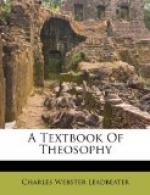When a man has succeeded in unfolding his latent possibilities so far that he attracts the attention of the Masters of the Wisdom, one of Them will probably receive him as an apprentice upon probation. The period of probation is usually seven years, but may be either shortened or lengthened at the discretion of the Master. At the end of that time, if his work has been satisfactory, he becomes what it commonly called the accepted pupil. This brings him into close relations with his Master, so that the vibrations of the latter constantly play upon him, and he gradually learns to look at everything as the Master looks at it. After yet another interval, if he proves himself entirely worthy, he may be drawn into a still closer relationship, when he is called the son of the Master.
These three stages mark his relationship to his own Master only, not to the Brotherhood as a whole. The Brotherhood admits a man to its ranks only when he has fitted himself to pass the first of the great Initiations.
This entry into the Brotherhood of Those who rule the world may be thought of as the third of the great critical points in man’s evolution. The first of these is when he becomes man—when he individualizes out of the animal kingdom and obtains a causal body. The second is what is called by the Christian “conversion”, by the Hindu “the acquirement of discrimination”, and by the Buddhist “the opening of the doors of the mind”. That is the point at which he realizes the great facts of life, and turns away from the pursuit of selfish ends in order to move intentionally along with the great current of evolution in obedience to the divine Will. The third point is the most important of all, for the Initiation which admits him to the ranks of the Brotherhood also insures him against the possibility of failure to fulfil the divine purpose in the time appointed for it. Hence those who have reached this point are called in the Christian system the “elect”, the “saved” or the “safe”, and in the Buddhist scheme “those who have entered on the stream”. For those who have reached this point have made themselves absolutely certain of reaching a further point also—that of Adeptship, at which they pass into a type of evolution which is definitely Superhuman.




